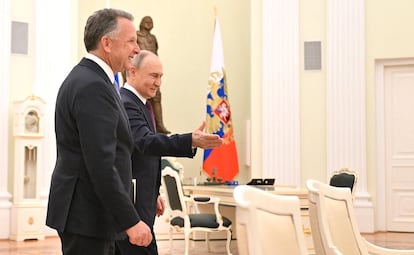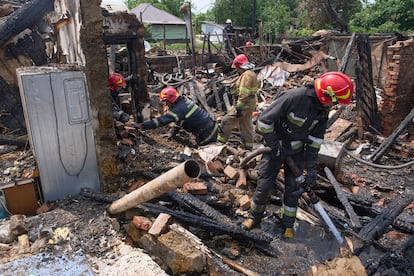U.S. diplomatic contacts with Russia and Ukraine are accelerating as the end of the 10-day ultimatum President Donald Trump gave Vladimir Putin to cease his military offensive in the invaded country or face sanctions against both Russia and its trading partners approaches.
White House special envoy Steve Witkoff met with the Russian leader in Moscow on Wednesday. The meeting in the Russian capital, which lasted nearly three hours, took place less than 48 hours before Friday, the deadline set by Washington. Trump had indicated on the eve of the meeting that he would wait for the results of the meeting for a final decision on the sanctions. His Secretary of State, Marco Rubio, stated that he expects to address the issue on Wednesday."We'll have more to say later today... maybe positive, maybe not," the US Secretary of State responded to questions from the press about the possibility of sanctions.
At the White House itself, a senior official confirmed Wednesday that the sanctions will be imposed on Friday, when Trump's ultimatum expires, unless Putin makes a last-minute U-turn.
Kremlin advisor Yuri Ushakov reported at the end of the talks that they had been"very useful and constructive" and that the US and Russian governments had "extended some signals" toward reaching an agreement. Ushakov did not specify what these"signals" meant, that is, what Kremlin decisions could prevent a rupture with Washington.
Hours later, Trump wrote a brief post on his social media platform, Truth, in which he asserted that the meeting was"very productive" and that "great progress" had been made, without specifying anything specific. He also added that he had been able to speak with several European leaders to inform them of the meeting's content and that everyone"agreed that the war must end." "We will continue working to make that happen in the coming days and weeks," he concluded. In addition, Trump spoke by phone with Zelensky after the meeting with his special envoy in Moscow. The Ukrainian president stated after the conversation, which also included European leaders, that his country supports a just peace and is determined to defend itself."Ukraine will definitely defend its independence. We all need a lasting and reliable peace. Russia must end the war it started," Zelensky said on the social media platform X.
Bloomberg reported Tuesday, citing anonymous sources, that the Kremlin was considering offering an"air truce," meaning a suspension by both sides of their long-range drone and missile bombings."If the deadline comes and Russia hasn't agreed to a ceasefire, there will be sanctions. But (Moscow) seems pretty good at avoiding them. They're smart people, pretty good at avoiding them," Trump said Monday.
U.S. Ambassador to NATO Matt Whitaker told Newsmax this weekend that his administration “will punish Russia with devastating tariffs and sanctions on August 8.” After that date, he added, “Russia will have no friends. It will have no trading partners. And its ability to finance this war will end.”
Moscow's partners
China and India are Russia's largest importers of hydrocarbons, the main source of funding for the Russian state and its military apparatus. Both Beijing and New Delhi have warned that, despite threats of sanctions from the US and the European Union, they will continue to purchase Russian gas and oil.
US pressure is focused primarily on India, which has a weaker geopolitical position than China. Trump signed an executive order this Wednesday imposing an extraordinary 25% tariff on Indian exports to the US.
This was the fifth meeting between Witkoff and Putin. Between February and April, Trump's envoy visited Russia four times to meet with the Russian president and other officials. These visits occurred at a time when Trump was most closely aligning with Putin.

The US president expressed his conviction at the time that a conciliatory stance with Putin would allow for a truce and peace negotiations. Both Trump and his team even stated on several occasions that territorial concessions to Russia were inevitable.
Trump changed his mind this July, when he admitted for the first time that Putin, as the Russian leader had told him, has no intention of halting the invasion. The Kremlin is putting forward several demands for a truce that effectively imply Ukraine's surrender: that kyiv's troops withdraw from four provinces illegally annexed by Russia; that international allies suspend arms transfers to the invaded country; and that Ukraine withdraw from NATO, among other conditions.
In addition to possible sanctions, Trump also authorized the transfer of weapons to Ukraine for the first time in July. Unlike his predecessor, Democrat Joe Biden, this war material, especially air defenses, must be purchased in advance by European allies.
Zelensky announced on Tuesday that his European partners have already committed to purchasing $1 billion (€870 million) worth of US weapons for Ukraine through NATO.
The Kremlin maintains that threats to sanction countries that trade with Russia are illegal. Three sources close to the Russian president told Reuters that Putin is unlikely to give in to Trump's sanctions ultimatum because he believes he is winning the war and his military objectives take priority over his desire to improve relations with the United States.

Putin has expressed skepticism about the impact of further US sanctions after those already imposed during three and a half years of war. According to sources close to him, the Russian leader doesn't want to anger Trump and is aware that he may be squandering an opportunity to improve relations with Washington and the West, but his war aims are more important to him.
In this regard, in the face of growing US pressure, Kremlin spokesman Dmitry Peskov opened the door on Monday to a meeting between Putin and Zelensky, a possibility previously ruled out. But for this meeting to take place, Peskov demanded that experts from both presidents meet beforehand to prepare for the summit.
Both the Ukrainian Foreign Ministry and the presidential office have insisted this week that Putin is merely trying to buy time with diplomatic moves and that new sanctions should be applied immediately against Moscow.
Lack of experience
Witkoff, who had no diplomatic experience before joining Trump's team in January, has been tasked with simultaneously seeking ceasefires in the wars in Ukraine and Gaza, as well as negotiating the crisis over Iran's nuclear program.
Witkoff was accused of echoing the Kremlin's narrative. In an interview with ultra-conservative journalist Tucker Carlson in March, he said there was no reason Russia would want to absorb Ukraine or seize more territory, and that it was"absurd" to think Putin would want to send his troops to Europe.
Ukraine and many of its European allies warn otherwise. Putin denies any intention to invade NATO territory, and Moscow has repeatedly called such accusations evidence of European hostility and"Russophobia."

